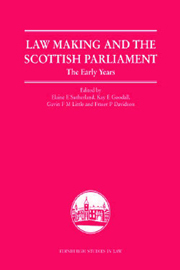Book contents
- Frontmatter
- Contents
- Preface
- List of Contributors
- Table of Cases
- Table of Westminster Statutes
- Table of Scottish Parliament Statutes
- Table of Westminster Statutory Instruments
- Table of Scottish Statutory Instruments
- THE SCOTTISH PARLIAMENT – ITS GENESIS AND OPERATION
- RIGHTS AND SOCIETY
- PUBLIC ADMINISTRATION AND SERVICES
- JUSTICE AND LEGAL SYSTEM
- 10 The Reform of the Scottish Judiciary
- 11 Criminal Law and Criminal Justice: An Exercise in Ad Hocery
- 12 Juvenile Offending: Welfare or Toughness
- 13 Evidence
- ECONOMY AND ENVIRONMENT
- Index
13 - Evidence
from JUSTICE AND LEGAL SYSTEM
Published online by Cambridge University Press: 05 September 2013
- Frontmatter
- Contents
- Preface
- List of Contributors
- Table of Cases
- Table of Westminster Statutes
- Table of Scottish Parliament Statutes
- Table of Westminster Statutory Instruments
- Table of Scottish Statutory Instruments
- THE SCOTTISH PARLIAMENT – ITS GENESIS AND OPERATION
- RIGHTS AND SOCIETY
- PUBLIC ADMINISTRATION AND SERVICES
- JUSTICE AND LEGAL SYSTEM
- 10 The Reform of the Scottish Judiciary
- 11 Criminal Law and Criminal Justice: An Exercise in Ad Hocery
- 12 Juvenile Offending: Welfare or Toughness
- 13 Evidence
- ECONOMY AND ENVIRONMENT
- Index
Summary
INTRODUCTION
Various chapters in this work will no doubt be able to allude to the root and branch reform of the law wrought by the Scottish Parliament, or to how certain areas of the law languished for many years in dire need of legislative reform but were unable to command parliamentary time prior to the advent of the Scottish Parliament. This cannot be claimed in relation to the law of evidence. While much of this area of the law continues to be judge-made, statute has intruded on the law, often in radically important ways, from the middle of the nineteenth century onwards. While the Scottish Parliament has indeed passed measures of considerable significance for the law of evidence, these have tended to develop themes introduced by earlier measures, while probably the most important pieces of legislation were passed by the Westminster Parliament.
From the middle of the nineteenth century onwards, the Westminster Parliament passed measures which gradually abolished the manifold restrictions and prohibitions regarding the classes of individual who might give evidence. The story of the twentieth century perhaps tells how legislative intervention allowed courts to consider evidence which the common law had regarded as suspect or unworthy of attention. This might be best represented by the effective abolition of the rule against hearsay in civil cases through the Civil Evidence (Scotland) Act 1988, and the making of hearsay evidence admissible in criminal cases in situations where the maker of the statement was not available to testify as a witness as a result of the Criminal Justice (Scotland) Act 1995.
- Type
- Chapter
- Information
- Law Making and the Scottish ParliamentThe Early Years, pp. 250 - 268Publisher: Edinburgh University PressPrint publication year: 2011



